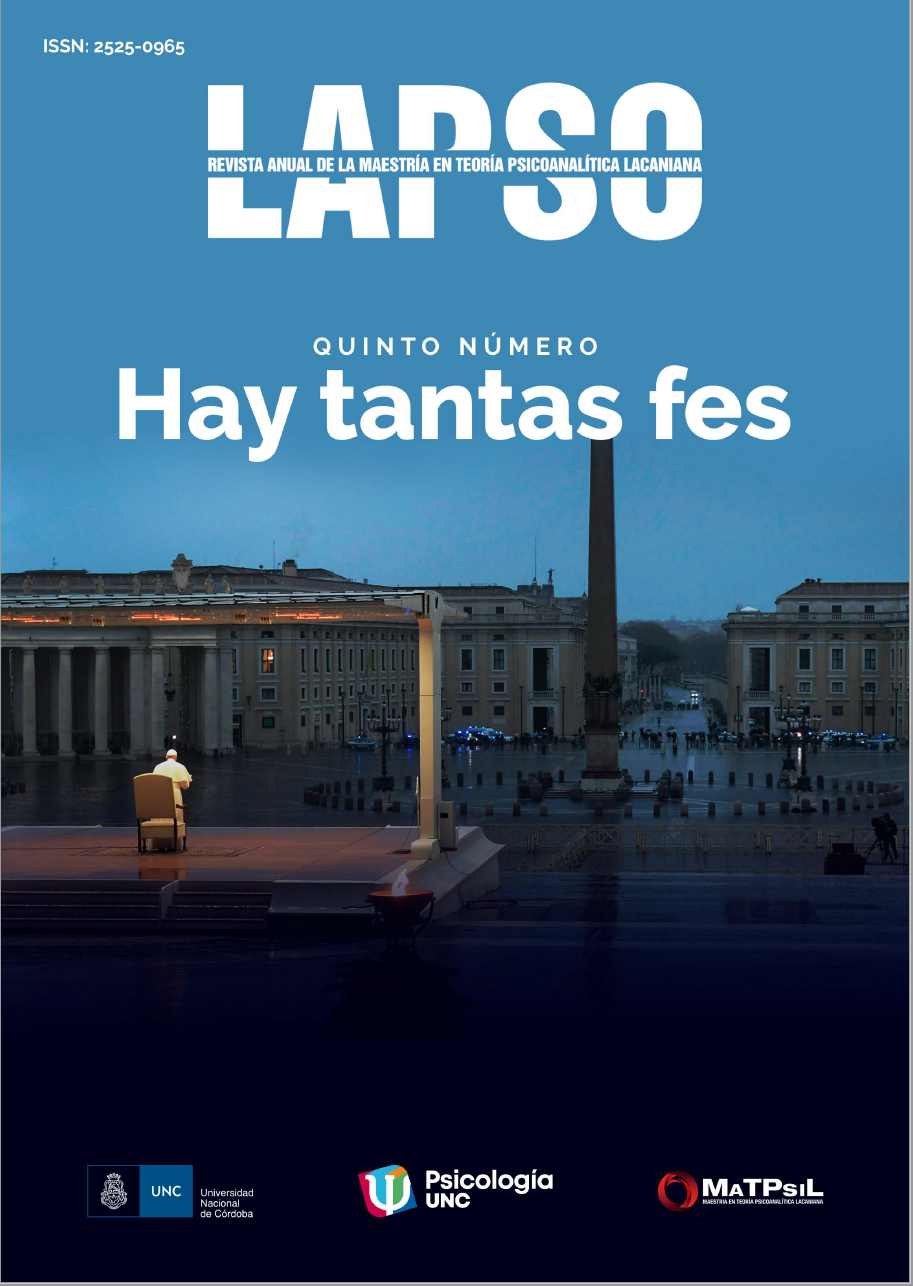The success of the religious
Keywords:
Religion, Catholicism |, Judaism, Orthodoxy, Heresy, EvangelismAbstract
In this work we propose to outline responses to the success of some of the most popular series of the moment whose theme focuses on the religious.
For this purpose, first, we will inquire about the success of the serial form, and then guide this brief journey in The Triumph of Religion (Lacan, 2005) as stated by Jacques Lacan. Finally, we will return to focus on the series Unorthodox (Netflix: 2020), The Handmaid’s Tale (HBO: 2017-2019), The young pope (HBO: 2016) and Ride Upon the Storm (Netflix: 2017-2018); also, in the rise of evangelism on Catholicism in Brazil.
The success of the religions, circumscribed at the time of the fall of the father’s name, can be specified in two ways:
1- The triumph is no longer so much of the traditional religion but of the religious. We refer to those religious communities that enact at all costs with capitalism.
2- Traditional religions, such as Catholicism and Judaism, is «a return to tradition» increasingly radical and closed.
In both modalities we place a nominal religious thrust, which shape the social bond and regulate the relationship of the speaking being to his body, bordering on «being named for.» (Lacan, 1974) “Being named to” verifies that in the face of the decline of the paternal and the power of the word, it is imposed as an iron order, returning in the real the father of jouissance, that is, the foundation of the modern superego.
Downloads
References
Atwood, M (11 de julio de 2018). “¿Un Estado esclavista?” en Infobae. Disponible en: https://www.infobae.com/cultura/2018/07/11/la-carta-de-margaret-atwood-a-los-argentinos-en-pleno-debate-por-el-aborto/
Brousse, M.-H. (13 de agosto de 2019). “Mujeres y Vida – O la Maldición de las Criadoras” en AMP Blog. Disponible en: http://uqbarwapol.com/mujeres-y-vida-o-la-maldicion-de-las-criadoras-por-marie-helene-brousse-ecf/
Feldman, D. (26 de abril de 2020). “Habla Deborah Feldman, la mujer que inspiró Poco Ortodoxa: ‘Lo que pasa en esta serie es un conflicto que todos pueden entender’” en La tercera. Disponible en: https://www.latercera.com/culto/2020/04/26/habla-deborah-feldman-la-mujer-que-inspiro-poco-ortodoxa-lo-que-pasa-en-esta-serie-es-un-conflicto-que-todos-pueden-entender/
Freston, P. (1994) “Breve histórico do pentecostalismo brasileiro en Alberto Antoniazzi” en Nem anjos nem demônios. Interpretações sociológicas do pentecostalismo, Petrópolis: Vocez.
Freud, S. (1939 [1989]) Moisés y la religión monoteísta, en Obras completas, t. XXIII. Buenos Aires: Amorrortu.
Lacan, J. (1956-1957 [2008]) “La Relación de Objeto” en El seminario de Jacques Lacan. Libro 4. Buenos Aires: Paidós.
Lacan, J. (1967 [ 2012]) “Proposición del 9 de octubre de 1967 sobre el psicoanalista de la Escuela” en Otros escritos. Buenos Aires: Paidós.
Lacan, J. (1969-1970 [1992]) “El reverso del psicoanálisis” en El Seminario de Jacques Lacan. Libro 17. Buenos Aires: Paidós.
Lacan, J. (1971-1972 [2012]) Hablo a las paredes. Buenos Aires: Paidós.
Lacan, J. (1972 [2012]) “El atolondradicho” en Otros escritos. Buenos Aires: Paidós.
Lacan, J. (1973 [ 2012]) “Televisión” en Otros escritos. Buenos Aires: Paidós.
Lacan, J. (1973-1974) Clase del 19 de marzo de 1974 en Seminario 21. Inédito.
Lacan, J. (1974-1975) Clase del 21 de enero de 1975 en Seminario 22. Inédito.
Lacan, J. (1974 [2005]) El triunfo de la religión. Buenos Aires: Paidós.
Laurent, E. (2002) Síntoma y nominación. Buenos Aires: Diva.
Laurent, E. (2004) Los objetos de la pasión. Buenos Aires: Tres Haches.
Laurent, E. (2019) “Entrevista a Eric Laurent” en IX Enapol. Odio. Cólera. Indignación: desafíos para el psicoanálisis. Disponible en: http://www.ixenapol.org
Marajofsky, L. (17 de abril de 2016). “TV on demand: ¿Nace un género narrativo?” en La Nación. Disponible en: https://www.lanacion.com.ar/opinion/tv-on-demand-nace-un-genero-narrativo-nid1889339
Miller, J.-A. (1992) Comentario del Seminario inexistente. Buenos Aires: Manantial.
Miller, J.-A. (2002-2003 [2012]) Punto cenit. Política, religión y psicoanálisis. Buenos Aires: Diva.
Miller, J.-A. & Laurent, E. (2005) El Otro que no existe y sus comités de ética. Buenos Aires: Paidós.
Miller, J.-A. (4 de noviembre de 2010a) “Mujer coraje” en Página 12. Disponible en: https://www.pagina12.com.ar/diario/psicologia/9-156235-2010-11-04.html
Miller, J.-A. (2010b) Extimidad. Buenos Aires: Paidós.
Miller, J.-A. (2015) “En dirección a la adolescencia” en El psicoanálisis 28. ELP: Madrid.
Miller, J.-A. (2017) “Elogio de los heréticos” en Lacaniana 23, Buenos Aires: Grama.
Mizrahi, D. (18 de enero de 2020) “El evangelismo se encamina a dominar Brasil en 2032: cuáles son las claves de su éxito y qué significa para el país” en Infobae. Disponible en: https://www.infobae.com/america/america-latina/2020/01/18/el-evangelismo-se-encamina-a-dominar-brasil-en-2032-cuales-son-las-claves-de-su-exito-y-que-significa-para-el-pais/
Oro, P. O. y Tadvald, M. (2019) “Consideraciones sobre el campo evangélico brasileño” en Revista Envío 447. Disponible en: http://www.cries.org/wp-content/uploads/2019/08/025-Revista.pdf
Semán, P. (11 de abril de 2019) “¿Quiénes son? ¿Por qué crecen? ¿En qué creen? Pentecostalismo y política en América Latina” en Nuso 280. Disponible en: https://nuso.org/articulo/quienes-son-por-que-crecen-en-que-creen/
Wajcman, G. (2019) Las series, el mundo, la crisis, las mujeres. Buenos Aires: UNSAM.
Downloads
Published
How to Cite
Issue
Section
License

This work is licensed under a Creative Commons Attribution-NonCommercial 4.0 International License.
Se permite la generación de obras derivadas siempre que no se haga con fines comerciales. Tampoco se puede utilizar la obra original con fines comerciales.


